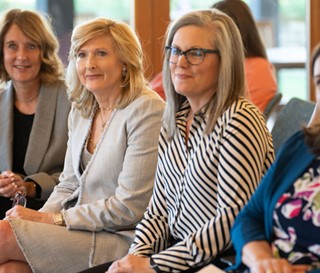‘Choose Your Person’ helps for end-of-life care

Mercy Care CEO Lorry Bottrill, Hospice of the Valley Executive Director Debbie Shumway, Gov. Katie Hobbs and Contexture CEO Melissa Kotrys urge Arizonans to learn more about the Choose Your Person campaign. The statewide initiative asks people to register their advance directives with the Arizona Healthcare Directives Registry, to ensure their wishes are honored.
Arizona Capitol Times
Oct. 13, 2023
by Kiera Riley
The Arizona Healthcare Directives Registry, which houses living wills, power of attorneys’ forms and medical care directives for pre-hospital and end of life care, has grown by about 22,000 accounts in the past two years.
About 98,000 people are registered with AzHDR. But medical and health care providers say gaps in information persist and fall below the national average, which sits at about one in three adults.
In a concerted effort to up registration with the state database, Contexture, the platform operating the AzHDR, in partnership with Hospice of the Valley and Mercy Care, announced an education campaign dubbed “Choose Your Person,” to prompt more Arizonans to take the first step by naming and registering someone as their power of attorney.
The “Choose Your Person” initiative was launched on Oct. 11 at Hospice of the Valley’s Dementia Care and Education Campus at 3811 N. 44th St. in Phoenix at an event where Gov. Katie Hobbs spoke.
Arizona’s database on advanced health directives was previously housed in the Arizona Secretary of State’s Office. But in 2019, the Legislature passed a bill expanding health care access transferring the database to Contexture, the state’s health information exchange operator.
Contexture received a one-time $1 million appropriation from the state to set up the registry in 2021 and has since relied on foundations and other private entities to cover the $2.5 million annual operating costs.
Since October 2021, the AzHDR grew from about 75,000 accounts to around 98,000 now. Contexture projects the number of accounts to eclipse 100,000 by the end of the year.
Kristin Weissinger, vice president of government affairs at Contexture, said the goal is to eventually surpass the national average, which would mean the AzHDR would need to add more than 1 million accounts statewide.
Melissa Kotrys, CEO of Contexture, said, given the national average, it’s likely some Arizona residents have prepared advance medical directives but have yet to register them with the statewide database.
“There is a general misconception that just because you have your documents done, that they’ll be available when and where they’re needed. If they’re in a filing cabinet, if they’re in a medical record somewhere, but you end up in the hospital somewhere else,” Kotrys said. “That might not be the case.”
She continued, “Being able to have a system where they are available electronically, in real time, when and where they’re needed, can honestly ensure that everybody’s getting the end-of-life care that they want, versus having different procedures, different life sustaining treatments, and other things that may not be their wishes.”
Debbie Shumway, executive director of Hospice of the Valley, said the barriers to enrolling and accounting end-of-life wishes include lack of knowledge, lack of access to a notary or taboos around discussions of incapacity or terminal illness.
“Those essential conversations so often aren’t had but need to be,” Shumway said.
Mercy Care, a Medicaid health care plan, provided a $670,000 grant to Hospice of the Valley and Contexture to train about 50 community assistors and host workshops and pop-ups to register people first with a health care power of attorney.
The focus of community workshops will center on families of people living with dementia or other serious illness, with a focus on traditionally underserved communities that are less likely to have advance care planning conversations and complete their advance directives, such as Hispanic, Black, LGBTQIA+ and unhoused communities.
Hobbs spoke at the launch of Choose Your Person and admitted she did not have an advance health care directive herself.
“Because of this event, I will be having this conversation with my family to ensure that it gets taken care of, so already this campaign is having an impact,” Hobbs said.
